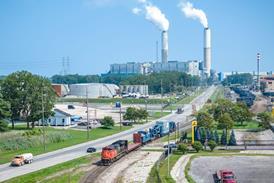Advocates of exhaust gas cleaning systems (EGCS) are championing the use of the technology as a way to reduce global CO2 emissions, as well as complying with the looming IMO sulphur 2020 regulations.

The Clean Shipping Alliance 2020 (CSA 2020), which represents commercial and passenger shipping companies and supports the use of ECGS, said that there have been several independent studies stating that wash water emitted from scrubbers is harmless to the environment.
CSA 2020 added that the continued use of heavy fuel oil with an ECGS will also help towards global CO2 reduction targets.
In a study published by Norway’s independent research organisation, SINTEF, chief scientist Dr Elizabeth Lindstad concluded that from well-to-wake the continued use of heavy sulphur fuel oil (HSFO) or heavy fuel oil (HFO) with an EGCS is the most environmentally beneficial means of meeting global Greenhouse gas (GHG) emissions targets.
After detailing findings from research involving full scale testing on a number of newbuild vessels, Dr Lindstad reportedly told CSA 2020 that: “[Studies] indicate that two-stroke engines with exhaust gas recirculation (EGR) and scrubbers represent the most cost and GHG-effective way of meeting both IMO Tier 3 NOx rules and the 2020 sulphur cap.”
She added that, based on the energy consumed during the global production of distillate fuels, the continued use of residual fuel will have a positive impact on global GHG emissions, given the energy required to produce distillates would result in higher levels of CO2 being released into the atmosphere.
This point was also made by the Spliethoff Group, which has opted to install scrubbers on the majority of its fleet of multipurpose vessels. The systems have already been in use on some of the group’s ships since 2012. By using scrubbers, it removes not only the sulphur, but also a significant amount of black carbon and particulate matter from the exhaust gasses.
In a video promoting the use of scrubbers, the company said: “Minimising our environmental footprint has long been a focal point for the Spliethoff Group. The reduction of emissions is a fundamental part of this. The production of low sulphur fuels requires energy, which means the use of these fuels results in significantly higher CO2 emissions overall, compared to scrubber technology.”
Plus, the one-off investment can seem like a better alternative to the uncertainty facing carriers that have chosen to switch from HFO; for the operators opting to use low sulphur fuel oil come 2020, there has been a lack of clarity about the price availability and quality of compliant fuel.
Still, the decision of whether to install scrubbers has been based on individual vessel specifications and the economic viability of this investment. And, with increased fuel consumption of up to 5 percent when the scrubber is operational, it seems that higher operating costs will be across the board.















